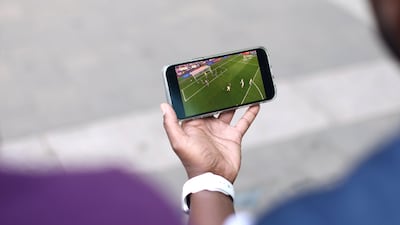Etisalat by e&, the UAE's biggest telecoms operator, and China's Huawei Technologies said that they have successfully completed the Middle East and North Africa's first trial of the 6GHz spectrum, which is deemed the next step in the evolution of 5G technology.
The trial's success takes telecom providers a step closer to more seamless and reliable mobile services to address the rapid growth in the number of mobile devices, the Abu Dhabi-based company said in a statement on Wednesday.
It is also expected to support the development of the metaverse, the emerging digital space where users can interact as avatars or digital representations of themselves in virtual worlds, and the economic opportunities it brings.
“5G allows the industry to support national digital transformation goals by providing reliable, high capacity, low latency and wide-area connectivity to consumers and industries,” Khalid Murshed, chief technology and information officer of Etisalat UAE, said.
“The metaverse is opening untapped opportunities with hyper-personalised experiences powered by AI.
“The future is powered by artificial intelligence and analytics, with the metaverse playing a role yet to be defined. This kind of technology disruption will create challenges but simultaneously bring massive prospects to this dynamic industry.”
Wi-Fi channels, or network channels, are the mediums through which wireless internet sends and receives data. At present, they use the 2.4GHz and 5GHz bands.
Each frequency has multiple channels — 2.4GHz has 11, while 5GHz has 45 — but only a handful of these work without overlapping, which is the reason for slowing connections.
The 6GHz band has the most channels — theoretically up to 59 — and offers non-interference between channels that would enable operational flexibility and more reliable continuity, according to Chinese network gear maker TP-Link.
Potential 5G interference could affect altitude readings on some aircraft, which was the reason for a major disruption at US airports this year that forced airlines to alter flight plans or scrap them altogether.
The 6GHz band is a mid-band frequency that sits at a balancing point between coverage and capacity, which is seen as the most suitable environment for 5G connectivity.
Extending the 5G bandwidth by harmonising the 6GHz spectrum may improve network performance, etisalat said.
The broad and contiguous channels offered by 6GHz will reduce the need for network densification and make next-generation connectivity more affordable, it added.
Reliable Wi-Fi and broadband connectivity is regarded as a key driver of economic growth which was demonstrated during the coronavirus pandemic when online working increased, according to Hewlett-Packard Enterprise unit Aruba said.
In the Europe, Middle East and Africa region, the UAE has been one of a handful of countries that have enabled 6GHz local area networks — systems designed to provide wireless access between devices — since 2021, according to the Wi-Fi Alliance.

Etisalat said that the 6GHz band will bring more innovative applications to society with faster and more reliable mobile broadband. This would result in new services, that will increase efficiency, reduce costs and improve safety.
The healthcare industry, for example, can use this technology to make advanced telemedicine with remote surgery possible, it added.
“5G use cases today accelerate digital transformation across industries and sectors, unleashing new waves of innovation that will benefit billions,” etisalat said.
5G networks and technologies support next-generation industry 4.0 and implementations in health care and transport, all depending on bandwidth, coverage and capacity, it said.
The advancements in broadband cellular networks are building blocks towards the next iteration, the 6G. However, this is not expected to be fully realised until towards the end of the decade as standards continue to be discussed and developed by telecom companies and global bodies.
Etisalat announced its plans to explore 6G technologies at last year's Mobile World Congress in Barcelona.
South Korea's Samsung, the world's biggest mobile phone manufacturer, in a paper published in July 2020, said it expects 6G standards to be fleshed out by 2028, with commercialisation beginning in the same year and widespread adoption in 2030.


